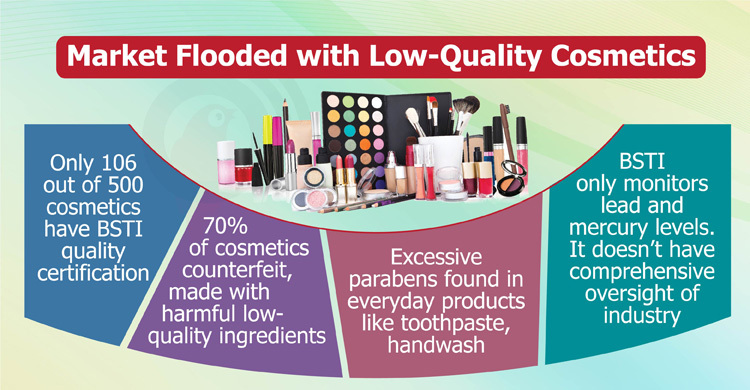Silent danger lurking in Bangladesh's cosmetics market

The cosmetics market in Bangladesh is booming, with thousands of branded, non-branded, domestic, and foreign products flooding the shelves. From hair care to skincare, more than 500 types of cosmetics are readily available.
But beneath this dazzling variety lies a pressing concern: a significant portion of these products are unverified, counterfeit, or adulterated, putting consumers' health at serious risk.
Despite its mandate, the Bangladesh Standards and Testing Institution (BSTI)—the national authority for setting and enforcing quality standards—has certified only 106 products out of the hundreds circulating in the market. Many harmful chemicals in these unregulated products are wreaking havoc on public health, but the oversight remains minimal.
A cosmetic catastrophe: 70% products in market fake
Sellers themselves often struggle to differentiate between authentic and counterfeit products. Factories in areas like Chawkbazar and Keraniganj in Dhaka, and various district towns, churn out fake cosmetics that closely mimic well-known brands. These counterfeits are sold openly, even in large supermarkets, with packaging that mirrors international brands.
According to the Consumers Association of Bangladesh (CAB), 70% of cosmetics in the country are either counterfeit or of poor quality. Many products lack essential labeling, expiration dates, or proper manufacturer information.
A CAB survey found that 45% of cosmetic products lack BSTI certification, and 75% do not include the manufacturer’s address.
Former DG of the National Consumer Rights Protection Department, AHM Shafiquzzaman, now the secretary of labour and employment ministry, confirmed that most imported cosmetics enter the market through illegal channels, bypassing proper checks. “There is no cosmetic product in Bangladesh that is not counterfeited. This is a serious threat to public health,” he said.
Dangerous chemicals in daily use
Harmful chemicals like lead, mercury, benzophenone, arsenic, cadmium, and parabens are commonly found in low-quality cosmetics. While parabens, used as preservatives, extend product shelf life, they are linked to severe health risks, including hormone disruption and cancer.
Dr Md Abul Hashem, Senior Technical Adviser to the research organisation ESDO, highlighted the dire consequences of using such products. “High levels of toxic chemicals are silently damaging our health. Regular use increases the risk of skin cancer and other diseases,” he explained.
BSTI has yet to develop systems to test for these harmful substances comprehensively. Although some progress has been made in banning products with high levels of lead and mercury, there’s little focus on newer harmful chemicals like parabens.
Health risks and lack of oversight
The long-term health consequences of using adulterated cosmetics are alarming. According to Dr Faruque Pathan of Birdem Hospital, unchecked use of harmful chemicals in daily products has contributed to rising rates of hormone disorders, infertility, and cancer. “The inaction of the supervisory agencies is costing people their lives,” he said.
The call for reform
Despite the growing demand for cosmetics, BSTI’s response has been slow and limited. The standards set by the organization cover only 30% of products, leaving the rest unregulated. CAB Vice President SM Nazer Hossain criticised BSTI for its laxity, saying, “As the national standard-setting body, BSTI cannot avoid its responsibility. Their delays in formulating proper standards have left consumers unprotected.”
BSTI officials, however, cite resource limitations. Its Assistant Director Manjurul Karim pointed out, “While we’ve created standards for common cosmetics, the rapid market growth makes it challenging to keep up.”
What needs to change?
Experts agree that stricter regulations and more robust enforcement are urgently needed. Policies should focus on:
- Expanding BSTI certification to include all cosmetics.
- Banning harmful chemicals like parabens.
- Cracking down on counterfeit manufacturing and illegal imports.
- Increasing public awareness about the dangers of low-quality cosmetics.
The government, manufacturers, and consumer rights organizations must work together to restore trust in the cosmetics market and safeguard public health. As the market grows, so does the responsibility to ensure quality and safety—something Bangladesh can no longer afford to overlook.

